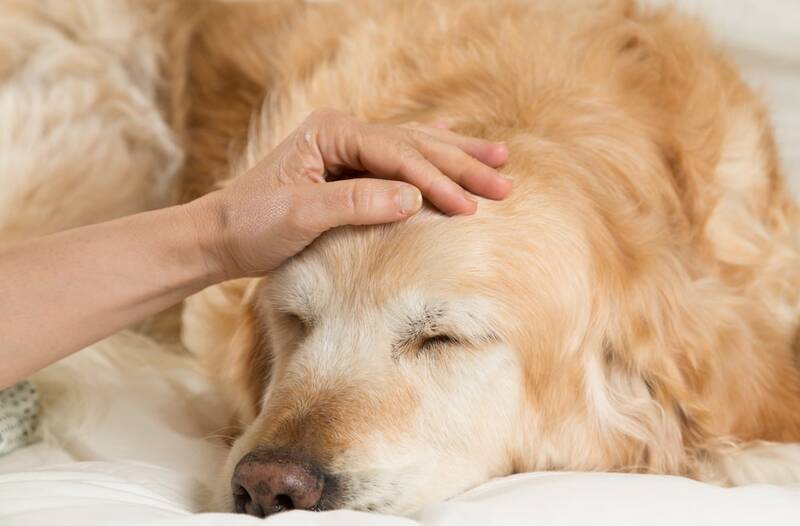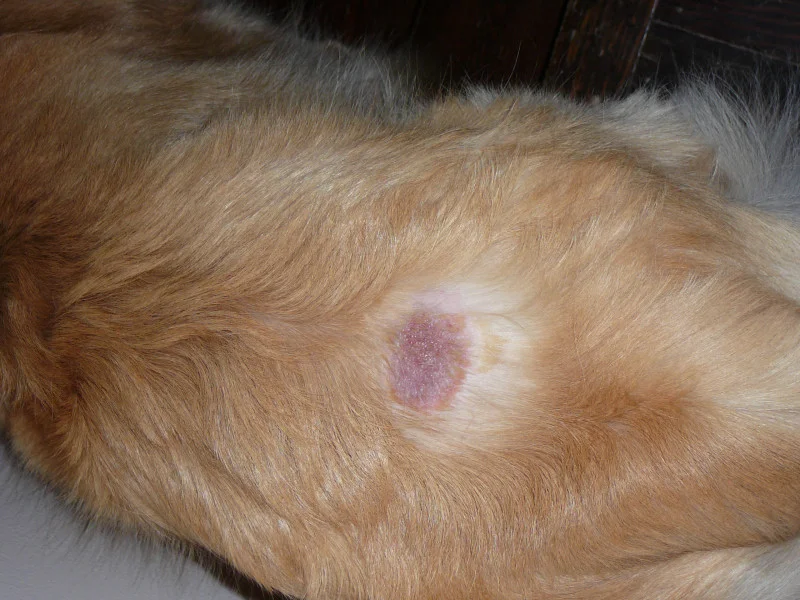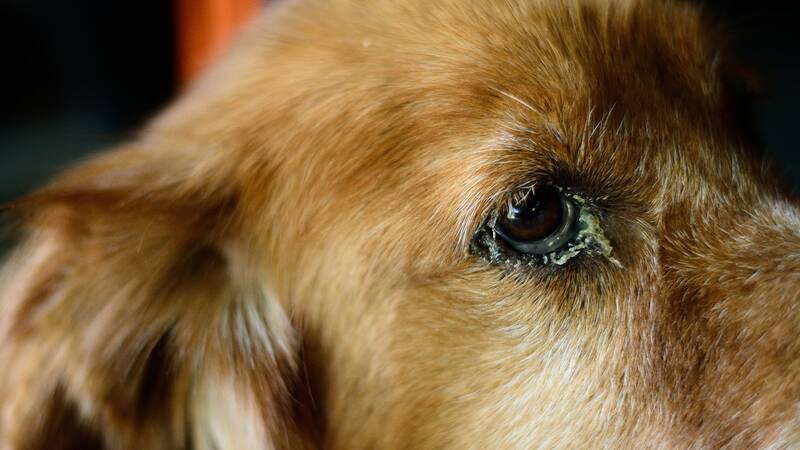So your Golden Retriever is as adorable and bubbly as always, but something seems off: He suddenly begins to scratch a lot, like a lot. You might wonder, “What’s happening? Should I take him to the vet?,” and most importantly, “What can I do to help him now?”
Excessive scratching often indicates that your pup is suffering from some Golden Retriever skin problems. Their thick, fluffy coat makes these problems challenging to notice. Here’s some good news: Once pinpointed, most skin issues are quite simple to tackle.
By being familiar with some of the most common Golden Retriever skin issues, you can quickly notice specific symptoms, helping your vet diagnose and find the best treatments for your fur baby. Read on!
6 Common Golden Retriever Skin Issues

Because of their thick, water-resistant fur and genetic predispositions, golden retrievers are prone to certain skin problems. Here are six typical skin illnesses that they frequently face.
Golden Retriever Skin Allergies
Like their owners, Golden Retrievers might develop allergies to certain foods or environmental irritants at any time. The most obvious symptoms of canine allergies are persistent itching and scratching, but you may also notice other clinical signs, such as sneezing, eye irritation, nasal congestion, and hair loss.
Allergies in dogs cannot be treated, but it doesn’t mean your beloved Goldie is doomed for good. Veterinarians can still decrease the severity of your pup’s allergic reactions by using medications and other forms of treatments. We have met many allergic dogs that lead a long and happy life.
Skin allergies often fall into two categories: Food and environmental.
- Food allergies: This accounts for roughly 10% of canine allergies. Common allergens are proteins from beef, chicken, lamb, fish, and dairy. In some rare cases, Golden Retrievers might also be allergic to grains like soy and corn. Once suspecting, veterinarians would recommend cutting potential allergens out of their diet to see if the symptoms are solved. Find out the best dog food for golden retrievers with suitable ingredients to help them be healthy.
- Environmental allergies: More common than the category above, environmental allergies may come from inside or outside your home. Possible allergens include plants, fungi, and cleaning products with heavy scents. Depending on the intensity of your Goldie’s symptoms, veterinarians will recommend medications, antifungals, or antibiotics.
Parasites
If you have an outdoor dog, the chance of him catching parasites increases. Some parasites that might affect your Golden Retriever’s skin health are:
- Fleas: The bite of a single flea is enough to cause intensive itching for many dogs. Once you suspect your Goldie has come in contact with fleas, examine the base of his tail, as well as the skin around his neck and cheek. These places are most likely to find flea bites. To treat this condition, veterinarians will clip and clean the hot spots, give your dog antibiotics for secondary bacterial infections, and use medications to remove fleas.
- Ticks and mites: While not as irritating as fleas, ticks and mites carry diseases, such as Lyme. Thus, they should be removed from your pup as soon as you notice to protect him from disease transmission. Thankfully, many flea treatments with prescription strength also work to keep ticks and mites away.
Hot Spots in Golden Retriever Skin

While hot spots are often symptoms of other conditions, they can be a problem on their own, especially in humid weather or after your Golden Retriever stays wet for a long. A wet coat is perfect for hot spot development, as it creates a warm and humid area against the dog’s skin
Eliminating potential causes is a step in the diagnostic process. Your veterinarians will first try to rule out other potential causes, such as parasites and allergies. Then, depending on the condition’s severity, they may recommend:
- Antibiotics, antiseptic solutions, or steroids
- Antimicrobial hot spot spray
- Hot spot antimicrobial hydrogel
- Medicated shampoo
If they come alone, hot spots are simple to tackle. After a few days of treatments, your lovely Goldie will feel like themselves again.
Skin Infections
Every dog has symbiotic yeast and bacteria living on their skin. However, when the skin’s protective layer is damaged, skin microorganisms may react to these bacteria, causing infection.
Pimples, itching, redness, odor, flaky skin, and hair loss are common symptoms of a bacterial skin infection. Yeast infection might also include thickened hyperpigmented skin. Antibiotics or antifungals are often used in treatment.
Acral Lick Dermatitis
The characteristic symptom of this condition is visible hairless areas, normally on the front legs, as a result of over-licking. The root causes of excessive licking might range from hormonal imbalance to boredom, anxiety, and stress.
Acral lick dermatitis is not life-threatening, but you need help from your local veterinarians to find out the underlying cause.
Skin Cancer
It’s normal to feel the lumps and bumps on your Golden Retriever’s skin. However, some of these can be cancerous. That’s why we always recommend pet parents brush their fur babies daily to examine the skin for any abnormal signs. Unusual skin changes should be checked thoroughly to see if they require treatment or not.
After all, don’t forget that Golden Retriever has a significantly higher cancer rate than other dog breeds. This doesn’t mean your dog can’t live a long and happy life, but as responsible owners, we need to always be cautious of unusual changes or irregularities in your pet’s body and behaviors
Causes of Skin Problems in Golden Retrievers

Understanding the root causes of golden retriever skin issues is crucial for effective management and prevention.
Genetic Factors
Golden Retrievers have a genetic predisposition to certain skin conditions, particularly allergies and atopic dermatitis.
Living Environment and Care Habits
- Exposure to allergens in the home or outdoor environment
- Inadequate grooming or over-bathing
- Use of harsh grooming products
Unsuitable Diet
Poor nutrition can contribute to skin problems. Essential fatty acids, in particular, play a crucial role in skin health.
Stress and Psychological Factors
Anxiety, boredom, or changes in routine can manifest as skin issues in some Golden Retrievers.
Preventing Skin Problems in Golden Retrievers

Preventing skin problems in Golden Retrievers involves regular care and attention to their coat and overall health. Here are some key strategies to prevent Golden Retriever skin issues:
- Regular grooming: Brushing your Golden Retriever’s coat 2-3 times a week is crucial for maintaining skin health. This practice removes loose fur, prevents matting, and distributes natural oils throughout the coat. Regular grooming also allows you to inspect your dog’s skin for any abnormalities, catching potential issues early.
- Proper bathing routine: So how often to bathe golden retrievers? Bathe your Golden every 6-8 weeks, or as needed, using the best shampoo for golden retrievers that are mild, dog-specific shampoo. Proper bathing helps keep the skin clean without stripping essential oils. Always rinse thoroughly to remove all shampoo residue, as a leftover product can irritate the skin and lead to problems.
- Balanced nutrition: A diet rich in omega-3 and omega-6 fatty acids promotes healthy skin and a shiny coat. Consider adding supplements like fish oil to your dog’s diet after consulting with your vet. Proper nutrition strengthens the skin’s barrier function, making it more resilient against infections and irritants.
- Parasite prevention: Regular flea, tick, and heartworm prevention is essential for skin health. Parasites can cause severe skin irritation and infections. Stick to your vet’s recommended prevention schedule and check your dog for ticks after outdoor activities in high-risk areas.
- Environmental management: Keep your Golden’s living area clean and free from allergens. Regularly wash bedding in hot water to eliminate dust mites and consider using hypoallergenic bedding if your dog is prone to allergies. A clean environment reduces the risk of skin irritations caused by environmental factors.
- Proper drying after water exposure: Thoroughly dry your dog after swimming or bathing, paying special attention to areas prone to moisture retention like ears, paws, and skin folds. Excess moisture can create an environment conducive to bacterial or fungal growth, leading to skin infections.
- Avoiding over-bathing: While cleanliness is important, bathing too frequently can strip natural oils from your dog’s skin, leading to dryness and irritation. Stick to the recommended bathing schedule unless advised otherwise by your vet. This helps maintain the skin’s natural protective barrier.
Frequently Asked Questions About Skin Problems in Golden Retrievers
Q: Are Golden Retrievers Prone to Food Allergies?
A: Yes, Golden Retrievers can develop food allergies. Common allergens include beef, chicken, dairy, and wheat. An elimination diet trial under veterinary supervision is the best way to identify food allergies. Make sure to feed your furry friend with the best dog food for golden retrievers with allergies to keep their health good.
Q: How to differentiate between allergies and skin infections?
A: Although allergies and infections may exhibit similar symptoms, infections typically show signs such as a strong odor, pustules or oozing lesions, and crusting or scabbing. An accurate diagnosis requires a veterinary examination, which may include skin cytology or culture.
Conclusion
Skin issues in Golden Retrievers can be difficult to manage, but with proper care, many problems can be controlled or resolved. Regular skin maintenance, including grooming, inspections, and prompt attention to any concerns, is essential for your Golden Retriever’s skin health.
Keep in mind that while this guide offers useful information, it cannot replace professional veterinary care. If your Golden Retriever is facing ongoing golden retriever skin issues, it’s important to consult your veterinarian for an accurate diagnosis and personalized treatment plan. By being vigilant and proactive about your Golden Retriever’s skin health, you can help ensure they remain comfortable, healthy, and happy throughout their life.

With years of expertise as a pet care writer, I’ve acquired a specific interest in Golden Retrievers, who are one of the most popular and beloved dog breeds. Although I do not own a Golden Retriever, my extensive study and talks with pet professionals enable me to offer useful and reliable articles for dog owners. My work on this website covers important areas such as diet, grooming, and training for Golden Retrievers. My goal is to provide readers with the information they need to keep their dogs healthy and happy.

